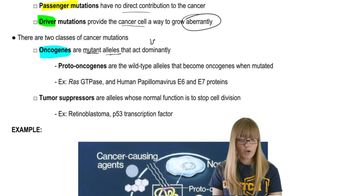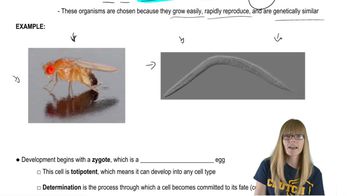Genetic tests that detect mutations in the BRCA1 and BRCA2 tumor-suppressor genes are widely available. These tests reveal a number of mutations in these genes—mutations that have been linked to familial breast cancer. Assume that a young woman in a suspected breast cancer family takes the BRCA1 and BRCA2 genetic tests and receives negative results. That is, she does not test positive for the mutant alleles of BRCA1 or BRCA2. Can she consider herself free of risk for breast cancer?
Table of contents
- 1. Introduction to Genetics51m
- 2. Mendel's Laws of Inheritance3h 37m
- 3. Extensions to Mendelian Inheritance2h 41m
- 4. Genetic Mapping and Linkage2h 28m
- 5. Genetics of Bacteria and Viruses1h 21m
- 6. Chromosomal Variation1h 48m
- 7. DNA and Chromosome Structure56m
- 8. DNA Replication1h 10m
- 9. Mitosis and Meiosis1h 34m
- 10. Transcription1h 0m
- 11. Translation58m
- 12. Gene Regulation in Prokaryotes1h 19m
- 13. Gene Regulation in Eukaryotes44m
- 14. Genetic Control of Development44m
- 15. Genomes and Genomics1h 50m
- 16. Transposable Elements47m
- 17. Mutation, Repair, and Recombination1h 6m
- 18. Molecular Genetic Tools19m
- 19. Cancer Genetics29m
- 20. Quantitative Genetics1h 26m
- 21. Population Genetics50m
- 22. Evolutionary Genetics29m
19. Cancer Genetics
Cancer Mutations
Problem 27
Textbook Question
What evidence indicates that mutations in human DNA mismatch repair genes are related to certain forms of cancer?
 Verified step by step guidance
Verified step by step guidance1
Understand the role of DNA mismatch repair (MMR) genes: These genes encode proteins responsible for correcting errors that occur during DNA replication, such as base-base mismatches or insertion-deletion loops.
Recognize that mutations in MMR genes can lead to a failure in correcting replication errors, resulting in an accumulation of mutations throughout the genome, a condition known as microsatellite instability (MSI).
Examine clinical and genetic studies showing that individuals with inherited mutations in MMR genes, such as MLH1, MSH2, MSH6, and PMS2, have a higher risk of developing certain cancers, particularly Lynch syndrome-associated colorectal and endometrial cancers.
Review molecular evidence from tumor samples demonstrating high levels of MSI and loss of MMR protein expression, which correlates with mutations in MMR genes and supports their role in tumor development.
Consider experimental data where restoring normal MMR gene function in cancer cells reduces mutation rates and tumorigenic potential, further confirming the causal relationship between MMR gene mutations and cancer.
 Verified video answer for a similar problem:
Verified video answer for a similar problem:This video solution was recommended by our tutors as helpful for the problem above
Video duration:
2mPlay a video:
Was this helpful?
Key Concepts
Here are the essential concepts you must grasp in order to answer the question correctly.
DNA Mismatch Repair Mechanism
DNA mismatch repair (MMR) is a cellular process that corrects errors introduced during DNA replication, such as base-base mismatches and insertion-deletion loops. Proper functioning of MMR maintains genomic stability by preventing mutations from accumulating. Defects in MMR genes impair this correction, leading to increased mutation rates.
Recommended video:
Guided course

Repair Pathways
Mutations in MMR Genes and Cancer
Mutations in human MMR genes, such as MLH1, MSH2, MSH6, and PMS2, disrupt the repair process, causing microsatellite instability and accumulation of mutations. This genomic instability is strongly linked to the development of certain cancers, notably hereditary nonpolyposis colorectal cancer (Lynch syndrome), demonstrating a direct connection between MMR gene defects and cancer risk.
Recommended video:
Guided course

Cancer Mutations
Evidence from Genetic and Clinical Studies
Genetic analyses of cancer patients reveal germline mutations in MMR genes associated with familial cancer syndromes. Tumor samples often show microsatellite instability and loss of MMR protein expression. Clinical studies correlate these molecular findings with increased cancer incidence, providing strong evidence that MMR gene mutations contribute to cancer development.
Recommended video:
Guided course

Genetics of Development
Related Videos
Related Practice
Textbook Question
1006
views


